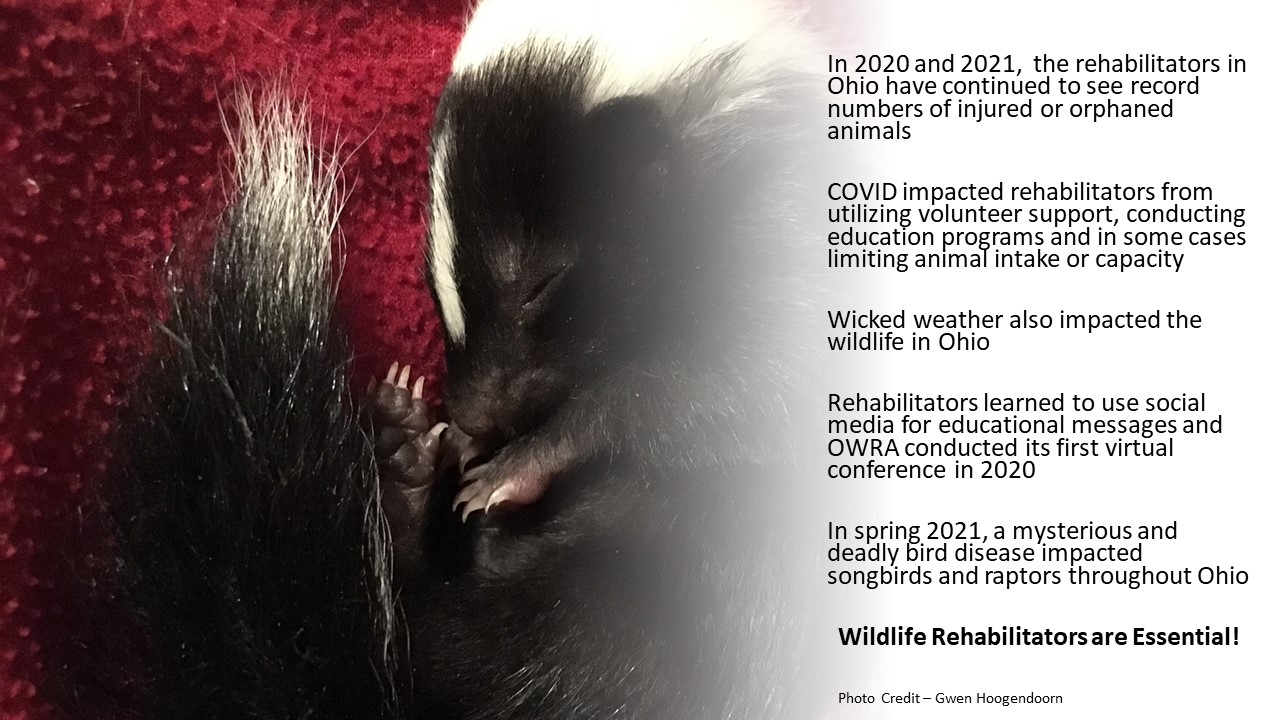Wildlife Rehabilitators are Essential!

The Ohio Wildlife Rehabilitators Association (OWRA) is a non-profit organization that is committed to educating concerned individuals and wildlife rehabilitators on regulatory compliance and best practices to help injured or orphaned animals throughout the state of Ohio.
The OWRA is composed of over 200 wildlife rehabilitators and community members from 34 of Ohio’s 88 counties. Members are dedicated to promoting wildlife rehabilitation and conservation all over Ohio. Educational training, networking and frequent communications allow OWRA to disseminate information regarding compliance, emerging diseases, environmental changes, and/or new animal care techniques to its members.
The COVID-19 pandemic created several challenges, yet opportunities, for wildlife rehabilitators and educators across the state. In 2020 and 2021, Ohio rehabilitators have received record numbers of injured or orphaned animals for admissions and care. The pandemic has caused many residents to remain close to home and explore the outdoors instead of amusement parks and such. This movement help showcase Ohio’s native wildlife to new levels. This led to people seeing birds and animals in need of intervention. Stories of concerned citizens transporting young squirrels or bunnies to a rehabber for assistance were shared among OWRA members. Residents developed a higher level of compassion for wildlife and recognized that wildlife rehabilitators are essential. So, the need for wildlife rehabilitation services increased.
However, the pandemic also caused the utilization of volunteers to decline. The concern for the safety of wildlife rehabbers and their dedicated volunteers caused many facilities to reduce or eliminate volunteer help. The combination of more wildlife in need and fewer volunteers has led to overwhelming times for Ohio rehabilitators. Wicked weather across the state put even more wildlife in dire situations. Storm winds blew nests from trees and hundreds of newly hatched songbirds were in need. One Ohio rehabber worked with local residence and media to make temporary nests for the songbirds and reuniting them with the parents. Many of the songbirds survived because of to the support of the community. Although normal resources were limited and the intake of songbirds increased, this one rehabilitation facility avoided unstainable wildlife admissions.
Many of the Ohio rehabilitators rely on education programs for children and senior adults to provide financial support for wildlife patient care. Again, because of the pandemic, in-person programs were cancelled or limited. However, several rehabilitators used this opportunity to enhance or develop on-line educational programs. In 2020, OWRA held its first ever virtual conference. While in-person events allow rehabbers to showcase Ohio native wildlife, on-line programs allowed rehabbers and educators to extend its reach to people not normally assessable, which includes beyond the state boarders.
Just as the pandemic concerns appeared to be subsiding, Ohio rehabbers soon faced another challenge in the Spring of 2021. A mysterious bird disease began impacting songbirds and raptors. Rehabilitators started receiving sick, dying birds. These continue to be heartbreaking times for those dedicated to helping injured wildlife. The OWRA coordinated an on-line meeting with its members to brainstorm all aspects of what rehabbers were experiencing regarding this mysterious disease. Support was also offered to help with members working with the deluge of sick birds. Being a wildlife rehabilitator is hard work. The hours are long. And the critters don’t appreciate that the rehabilitation efforts are for them. The importance of membership, comradery and support is imperative. OWRA is committed to helping Ohio wildlife rehabilitators and educators to overcome stressful times such as the pandemic, wicked weather or a mysterious bird illness. Through the support of our membership and donors, OWRA can provide the much-needed best practices and dialogue with those serving in the wildlife rehabilitation industry.
"In the end we will conserve only what we love; we will love only what we understand; and we will understand only what we are taught."
Baba Dioum, 1968